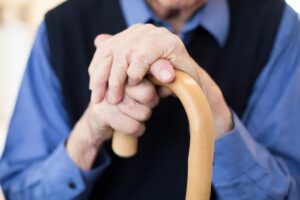How Much Is My Nursing Home Abuse Claim Worth?
Abuse and Neglect, Personal InjuriesWhen you or a loved one has been the victim of nursing home abuse, it’s only natural to seek justice and compensation. Unfortunately, determining the exact value of a nursing home abuse claim can be a complex process. Numerous factors influence the claim’s value, including the severity of the harm, the specific circumstances of the abuse, the laws in your state, and the evidence available to support your case. Understanding how personal injury attorneys evaluate nursing home abuse claims and understanding what compensation you may be entitled to can guide you through this difficult situation confidently.
Whether you are pursuing a claim for a family member who has suffered abuse or is seeking compensation on your behalf, it’s imperative to understand the factors that affect the value of nursing home abuse claims, the different types of damages, how to determine liability, and the steps to take when filing a claim. It’s in your best interest to hire a Charleston nursing home abuse attorney who can guide you through what steps to take.
What is Nursing Home Abuse?

Nursing home abuse refers to any form of mistreatment, neglect, or exploitation of elderly residents in a nursing facility. This abuse can take many forms, including physical, emotional, sexual, or financial exploitation. Nursing home residents are particularly vulnerable due to their age, physical limitations, and reliance on caregivers, which makes them easy targets for abuse. Some of the most common forms of nursing home abuse include:
- Physical Abuse: Hitting, pushing, restraining, or using excessive force on residents.
- Emotional Abuse: Verbal harassment, intimidation, humiliation, or isolation from others.
- Sexual Abuse: Any unwanted sexual contact or harassment.
- Neglect: Failing to provide adequate care, such as food, water, medical attention, and personal hygiene.
- Financial Abuse: Exploiting or stealing from residents by taking money assets or manipulating wills and financial documents.
Abuse in nursing homes can cause lasting physical, emotional, and financial harm if you suspect that a loved one experienced abuse in a nursing home, it’s imperative to act quickly to protect their well-being and seek compensation for the harm caused.
Factors That Affect the Value of a Nursing Home Abuse Claim

One of the first questions many families ask after discovering nursing home abuse is, “How much is my claim worth?” Unfortunately, there is no one-size-fits-all answer to this question. Each nursing home abuse case is unique, and the value of a claim depends on several key factors, including:
The Severity of the Harm
The severity of the harm suffered by the victim is one of the most important factors in determining the value of a nursing home abuse claim. Cases involving severe physical injuries, permanent disabilities, or death typically result in higher compensation. For example, if a resident has suffered severe neglect that led to malnutrition, infections, or bedsores, or if they faced physical or sexual abuse, the compensation will be significantly higher than in cases involving minor injuries or neglect.
Type of Abuse or Neglect
Different types of abuse may result in various amounts of compensation. For example, physical abuse may result in compensation for medical bills, pain and suffering, and emotional distress, while financial abuse may focus more on recovering stolen assets. Sexual abuse, due to its profoundly traumatic nature, often results in significant compensation for emotional suffering and long-term psychological impacts.
Medical Costs
One of the most tangible damages in nursing home abuse cases is medical expenses. Victims of abuse often require medical treatment, including hospital stays, surgeries, medications, and ongoing rehabilitation. These costs can be significant, and the responsible party may be required to compensate the victim for all medical expenses related to the abuse. Future medical costs, such as long-term care or therapy, may also be included in the compensation calculation.
Pain and Suffering
Nursing home abuse often results in significant physical and emotional pain and suffering. The level of pain and suffering will depend on the type of abuse, the duration of the abuse, and the severity of the injuries. Pain and suffering compensation accounts for the physical discomfort, emotional trauma, and mental anguish caused by the abuse. In some cases, victims may experience post-traumatic stress disorder (PTSD), depression, anxiety, or other long-term emotional issues, which can increase the value of the claim.
Punitive Damages
In some cases, the court may award punitive and compensatory damages. Punitive damages punish the wrongdoer for particularly egregious behavior and deter similar future actions. The court may award punitive damages if the nursing home staff engaged in misconduct or the facility acted with gross negligence, recklessness, or intentional harm. These damages do not relate to the victim’s specific losses, but they can significantly increase the value of a claim.
The Victim’s Age and Health
The age and health of the victim at the time of the abuse can also impact the value of the claim. Elderly residents who are already in fragile health may be more severely affected by abuse, and the long-term impact on their well-being can be greater. On the other hand, younger, healthier residents may have a longer life expectancy and, therefore, suffer a more lasting impact from their injuries, which can increase the compensation awarded.
The Quality of Evidence
The strength of the evidence in a nursing home abuse case is directly related to the value of the claim. Reliable, convincing evidence, such as medical records, witness statements, photographs, and video surveillance, can help establish the extent of the abuse and the responsibility of the nursing home staff or facility. A well-documented case is more likely to result in higher compensation as it leaves little room for the defense to dispute the claim.
Insurance Coverage
The nursing home’s insurance coverage will also determine the available compensation. Many nursing homes have liability insurance covering abuse claims, but the policy limits may cap the compensation available. In some cases, multiple parties may be liable for the abuse, which can increase the available compensation if different insurance policies are involved.
Legal Representation
Having an experienced personal injury lawyer to represent your case can make a significant difference in the outcome of your claim. A knowledgeable nursing home abuse attorney will know how to investigate the abuse, gather evidence, negotiate with insurance companies, and pursue maximum compensation. Without proper legal representation, victims and their families may struggle to achieve the full value of their claims.
Forms of Compensation in Nursing Home Abuse Claims

Victims of nursing home abuse may be entitled to several different forms of compensation, depending on the specifics of the case. These include:
Medical Expenses
As mentioned earlier, medical expenses are often a significant part of a nursing home abuse claim. Compensation for medical expenses includes both the costs already incurred and future medical expenses related to the abuse. This may cover hospital bills, doctor visits, medications, surgeries, rehabilitation, and other necessary medical treatments.
Pain and Suffering
Pain and suffering compensation accounts for the physical pain, emotional distress, and mental anguish caused by the abuse. This is often one of the largest components of a nursing home abuse claim, especially in cases involving severe physical abuse or emotional trauma. Compensation for pain and suffering is subjective and can vary widely depending on the circumstances of the case.
Loss of Quality of Life
Elderly residents who suffer abuse often experience a diminished quality of life. They may lose their independence, suffer from long-term disabilities, or experience emotional distress that affects their ability to enjoy life. Compensation for loss of quality of life aims to address the impact the abuse has had on the victim’s overall well-being.
Emotional Distress
Along with pain and suffering, victims of nursing home abuse may qualify for compensation for emotional distress. Emotional distress damages aim to compensate the victim for the psychological effects of the abuse, such as anxiety, depression, fear, and PTSD. In cases involving emotional or sexual abuse, emotional distress damages can be substantial.
Loss of Consortium
In some cases, family members of the victim may qualify for compensation for loss of consortium. This refers to the loss of companionship, love, and support that a spouse or close family member experiences as a result of the victim’s injuries. Spouses typically bring loss of consortium claims, but children or other close family members may also be eligible in some cases.
Wrongful Death
If nursing home abuse results in the death of the resident, the victim’s family can file a wrongful death claim. Wrongful death compensation can include:
- Medical expenses.
- Funeral and burial costs.
- Loss of financial support.
- Compensation for the emotional pain and suffering of losing a loved one.
Wrongful death claims often result in significant compensation, especially if the death was preventable and caused by gross negligence or intentional harm.
Punitive Damages
As previously noted, courts may award punitive damages in cases where the nursing home’s actions were particularly egregious. Punitive damages aim to punish the wrongdoer and deter future misconduct, and they can significantly increase the total value of a nursing home abuse claim.
Determining Liability in Nursing Home Abuse Claims
To recover compensation for nursing home abuse, it’s necessary to determine who is liable for the abuse. Liability may rest with several different parties, including:
- Nursing Home Staff: Individual caregivers or staff members may be directly responsible for the abuse. This can include acts of physical, emotional, or sexual abuse, as well as neglect or financial exploitation.
- Nursing Home Facility: The nursing home itself may be liable if it fails to properly vet, train, or supervise staff members or allows unsafe conditions to contribute to the abuse.
- Third Parties: In some cases, third parties, such as contractors or outside caregivers, may be responsible for the abuse. For example, if the nursing home hired an outside company to provide caregiving services, that company may share liability for abuse.
A skilled nursing home abuse attorney will investigate the circumstances of the abuse to determine which parties are liable and pursue compensation from all responsible parties.
Steps to Take When Filing a Nursing Home Abuse Claim

If you or a loved one has been the victim of nursing home abuse, there are several steps you should take to protect your rights and maximize the value of your claim:
Seek Medical Attention
The priority is to ensure the victim’s safety and health. Seek immediate medical attention to address any injuries or medical conditions resulting from the abuse. Medical records will also serve as valuable evidence in your claim.
Report the Abuse
Report the abuse to the appropriate authorities, such as the nursing home administration, the local adult protective services agency, or law enforcement. Reporting the abuse creates a record of the incident and may prompt an investigation that can help your case.
Document the Abuse
Gather as much evidence as possible to support your claim. This may include photographs of injuries, medical records, witness statements, and any other documentation that shows the extent of the abuse and the harm it caused.
Consult a Seasoned Nursing Home Abuse Attorney
Contact a nursing home abuse attorney to discuss your case and explore your legal options. An experienced personal injury lawyer can aid you in navigating the legal process, gather evidence, and pursue maximum compensation for your claim.
Is Your Loved One a Victim of Nursing Home Abuse? Reach Out for Legal Advice Today
Nursing home abuse is a devastating experience for victims and their families. While no amount of money can undo the harm caused by abuse, pursuing a legal claim can provide much-needed financial compensation and help hold the responsible parties accountable. The value of a nursing home abuse claim depends on several factors, including the severity of the harm, the type of abuse, and the evidence available to support your case. Working with an experienced attorney can protect your rights and pursue justice for yourself or your loved one.
If you suspect that a loved one has experienced abuse in a nursing home, take action without delay. Contact a personal injury lawyer today to discuss your case and learn how to protect your family’s rights.
Nathan Hughey, an attorney and fourth-generation South Carolinian, founded Hughey Law Firm in 2007. Before that, he spent five years defending nursing homes and insurance companies. Leveraging his experience, he now advocates for those injured or wronged by such entities, securing over $220 million in verdicts and settlements.
